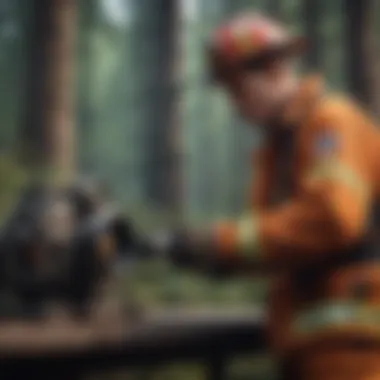Exploring Diverse Career Opportunities Beyond Firefighting for Former Heroes


Evergreen Trees Species
When pondering conservation practices for evergreen tree species, parallels can be drawn to the preservation and strategic planning needed to safeguard one's professional trajectory post-firefighting. Highlighting how conservation methods protect and preserve these trees illuminates the importance of nurturing and cultivating one's expertise to thrive in new career ventures.
Forest Management Techniques
Transitioning from the wilderness of firefighting to exploring forest management techniques echoes a journey of discovering new habitats and sustainable practices for growth. Just as strategies for wildlife habitat preservation ensure biodiversity and ecological balance, individuals embarking on new career paths must strategize on preserving their own skill sets and adaptability. Sustainable logging practices mirroring responsible timber harvesting methods emphasize the need for deliberate and thoughtful career moves.
In understanding fire prevention measures within forest management, parallels can be drawn to early detection systems for threats in one's professional landscape, identifying potential hazards and proactively mitigating risks. Ecosystem restoration initiatives align with efforts to rejuvenate and revitalize one's career trajectory, showcasing the capability to bounce back from challenges.
Climate Change Impact on Evergreen Forests
Examining the impact of climate change on evergreen forests provides a lens through which to view the evolving professional landscape. Much like how forests play a crucial role in carbon sequestration to combat climate change, individuals navigating career transitions must adapt to changing landscapes and embrace sustainability. Investigating weather pattern effects on forests reflects the necessity of forecasting trends in industries for informed decision-making.
Exploring biodiversity support amidst climate change sheds light on the need for professionals to be versatile and resilient in the face of evolving challenges. Delving into localized effects of climate change resonates with understanding regional job market dynamics and adapting strategies to thrive in diverse environments.
Management and Preservation of Evergreen Forests
Considering the historical context of American evergreen forests parallels reflecting on the legacy and traditions within different industries as individuals carve out their professional journey. Presenting the latest research studies mirrors the necessity of ongoing learning and adapting to stay relevant in changing career landscapes.
Highlighting ongoing conservation efforts showcases the resilience and dedication needed to protect and preserve not only physical landscapes but also one's professional standing amidst industry shifts and challenges. Success stories in conservation efforts inspire individuals to strive for excellence and sustainability as they navigate their own career paths.
Outdoor Activities in Evergreen Forests
The exploration of outdoor activities in evergreen forests offers a well-deserved break from the rigorous career exploration journey. Just as hiking trails provide paths to explore amidst nature, individuals transitioning careers can find solace and inspiration in newfound ventures. Discovering camping destinations reflects the need to pause, reflect, and rejuvenate in the face of career challenges.
Opportunities for nature photography and birdwatching are akin to moments of serenity and mindfulness in the whirlwind of career shifts and choices. Witnessing the beauty and diversity in nature serves as a reminder of the richness and vast possibilities awaiting individuals as they navigate through the wilderness of new career opportunities.
Firefighters possess unique skills and experience that can open doors to a range of diverse career paths beyond the realm of firefighting. This article serves as a comprehensive guide, shedding light on the various job opportunities available for former firefighters looking to transition into new roles and illustrating the ways in which they can leverage their existing skills and explore related industries. Let us delve deep into the possibilities that lie ahead for those seeking to forge a new career path after serving in the firefighting profession.
Understanding the Transition
Challenges Faced by Former Firefighters
Navigating the transition from firefighting to other professions brings forth its own set of challenges. Former firefighters are accustomed to high-pressure situations and adrenaline-pumping emergencies, and transitioning to roles that may not offer the same intensity can be daunting. The structured hierarchy and sense of camaraderie unique to firefighting may be missed in new environments. However, these challenges present opportunities for growth and adaptation, as former firefighters can utilize their resilience and problem-solving abilities to excel in diverse settings beyond traditional firefighting roles.
Transferable Skills from Firefighting


Firefighting instills invaluable skills that are highly transferable to a multitude of professions. The ability to remain calm under pressure, make swift decisions, and work effectively in teams are just a few examples of skills honed in firefighting that translate seamlessly to other industries. Former firefighters bring with them a strong work ethic, discipline, and a commitment to public service that are highly sought after in various sectors. Leveraging these transferable skills is key to a successful transition and opens doors to a plethora of rewarding career opportunities.
Exploring Options
Emergency Response and Disaster Management
The field of emergency response and disaster management offers a natural segue for former firefighters. Their experience in handling crises, assessing risks, and executing emergency protocols equips them well for roles in this field. Whether it's coordinating response efforts during natural disasters or developing preparedness plans for communities, former firefighters play a vital role in ensuring public safety and mitigating risks in times of calamity.
Training and Development Roles
Transitioning into training and development roles allows former firefighters to share their expertise and knowledge with others. From designing safety training programs for organizations to mentoring new recruits in emergency procedures, their hands-on experience adds a practical dimension to training initiatives. By fostering skill development and continuous learning, former firefighters contribute significantly to building competent and prepared teams in various industries.
Physical Fitness and Wellness Industry
The emphasis on physical fitness and wellness in modern society creates opportunities for former firefighters to pivot towards roles promoting health and well-being. With their background in maintaining peak physical condition and prioritizing health, former firefighters are well-suited for careers in personal training, wellness coaching, or even owning fitness centers. Their dedication to physical fitness serves as an inspiration to others, making a positive impact on individuals striving for better health.
Utilizing Skills in New Settings
Leadership Opportunities
Former firefighters inherently possess strong leadership qualities instilled through years of commanding emergency situations and leading teams under pressure. Transitioning into leadership positions in diverse industries allows them to apply their leadership acumen to effect positive change and drive organizational success. Their ability to make critical decisions swiftly and motivate teams towards common goals makes them invaluable assets in leadership roles.
Community Outreach Programs
Engaging in community outreach programs enables former firefighters to continue serving the public in impactful ways. By sharing their experiences, knowledge, and skills with the community, they play a vital role in educating and empowering individuals on safety protocols, disaster preparedness, and fire prevention. Participating in outreach initiatives fosters strong community ties and reinforces the importance of safety and vigilance in everyday life.
Risk Management Positions
Transitioning into risk management positions capitalizes on former firefighters' expertise in assessing and mitigating risks effectively. Their keen eye for detail, ability to identify potential hazards, and quick response to emergency situations make them well-suited for roles that involve analyzing risks and implementing strategies to minimize them. Former firefighters bring a unique perspective to risk management, guiding organizations towards proactive risk mitigation practices that safeguard their assets and stakeholders.
In-Demand Industries
In the arena of career transitions for former firefighters, understanding the significance of in-demand industries is paramount. These sectors, such as law enforcement and security, healthcare and medical services, and construction and engineering, offer vast opportunities for individuals with firefighting backgrounds. By delving into these dynamic industries, individuals can leverage their transferable skills and contribute meaningfully to various professional settings.
Law Enforcement and Security
Private Security Firms
In the domain of law enforcement and security, private security firms emerge as a fundamental player. These firms provide essential services across a spectrum of sectors, ranging from commercial establishments to private events. Their key characteristic lies in offering specialized security solutions tailored to clients' specific needs, making them a popular choice for individuals seeking post-firefighting career transitions. Private security firms excel in providing personalized security details and discreet protection, ensuring the safety and confidentiality of their clients. However, challenges such as regulatory compliance and varying work environments are factors to consider while venturing into this realm.


Government Agencies
Government agencies form another critical aspect of the law enforcement and security landscape. The hallmark of government agencies is their responsibility for upholding public safety and enforcing laws at local, state, or national levels. Choosing to work within a government agency can be attractive due to the diversity of roles available, from investigative tasks to community policing. The unique feature of government agencies lies in their emphasis on serving the public good and maintaining societal order. While opportunities for career progression and job stability make government agencies an appealing choice, navigating bureaucracy and hierarchical structures can pose challenges for those transitioning from firefighting roles.
Healthcare and Medical Services
In the realm of healthcare and medical services, career paths for former firefighters expand into crucial areas like emergency medical technicians (EMTs) and occupational health and safety roles. These sectors represent vital components of public health and well-being, offering avenues for firefighting professionals to apply their expertise in new environments.
Emergency Medical Technicians (EMTs)
Emergency Medical Technicians play a pivotal role in providing immediate medical assistance during emergencies. Their key characteristic revolves around their ability to assess, stabilize, and transport patients to medical facilities swiftly. This aspect makes EMT positions a popular choice for former firefighters looking to continue serving communities in critical situations. However, the demanding nature of emergency response work and the emotional toll of dealing with intense situations are aspects to consider when transitioning into an EMT role.
Occupational Health and Safety
Occupational health and safety positions focus on ensuring workplace environments adhere to safety regulations and standards to protect employees from harm. The unique feature of these roles lies in their proactive approach to preventing accidents and promoting employee well-being through risk assessments and safety protocols. Former firefighters venturing into occupational health and safety can benefit from their existing knowledge of emergency procedures and hazard management. However, the meticulous attention to detail required in these roles and the need for continuous training and awareness present challenges for transitioning individuals.
Construction and Engineering
The construction and engineering industries open doors for former firefighters to pursue roles such as building inspectors and safety officers, emphasizing structural integrity and workplace safety. These fields offer opportunities for individuals to apply their problem-solving skills and meticulous attention to detail in ensuring the quality and safety of built environments.
Building Inspectors
Building inspectors play a crucial role in evaluating construction projects to ensure compliance with building codes and regulations. Their key characteristic involves conducting thorough inspections to guarantee structural soundness and adherence to safety standards. Former firefighters transitioning into building inspection roles can leverage their experience in assessing risks and identifying potential hazards. The unique feature of building inspectors lies in their role as guardians of public safety, contributing to the overall well-being of communities by ensuring construction projects meet essential standards. However, the extensive knowledge base required in building codes and regulations and the frequent need for site visits pose challenges for those entering this field.
Safety Officers
Safety officers are pivotal in promoting a safe work environment by implementing safety policies and procedures within organizations. Their key characteristic is their responsibility for mitigating workplace hazards and fostering a culture of safety among employees. Former firefighters who pursue safety officer roles can transfer their expertise in risk assessment and emergency response to enhance workplace safety measures. The unique feature of safety officers lies in their role as proactive agents of prevention, reducing the occurrence of accidents and injuries in diverse work settings. Yet, the demanding nature of maintaining safety protocols and the need for effective communication with employees present challenges for individuals transitioning into safety officer positions.
Further Education and Training
Certifications and Courses
Project Management
Delving into the realm of project management, this certification holds immense value for former firefighters seeking new career pathways. Project management instills essential organizational, planning, and leadership skills vital for overseeing complex initiatives effectively. The structured approach of project management empowers individuals to strategize, execute, and monitor projects efficiently, ensuring optimal outcomes within specified timelines and budgets. By obtaining expertise in project management, individuals can seamlessly navigate diverse work environments, demonstrating their capacity to coordinate tasks proficiently and drive successful project completion.
Crisis Intervention
When redirecting their career trajectory, former firefighters can leverage the benefits of crisis intervention certification in mitigating challenging situations across various professional settings. Crisis intervention equips individuals with the necessary crisis assessment, intervention, and de-escalation techniques crucial for addressing emergencies effectively. This certification underscores the importance of swift decision-making under pressure, fostering resilience and adaptability in turbulent circumstances. Acquiring proficiency in crisis intervention empowers individuals to respond proactively to crises, ensuring the safety and well-being of individuals in distress.


Networking and Professional Development
Exploring networking and professional development avenues offers former firefighters invaluable opportunities to expand their professional circles and augment their skill sets. Networking at industry conferences provides a platform for exchanging insights, establishing connections, and fostering collaborations with peers and industry leaders. Attending such conferences enriches individuals with industry trends, best practices, and innovative approaches, enhancing their competence and market relevance. On the other hand, engaging with online learning platforms facilitates convenient access to specialized courses, workshops, and resources tailored to enhance professional competencies. Online learning platforms offer flexibility, self-paced learning, and diverse modules, enabling individuals to customize their learning journeys based on their career goals and aspirations.
Industry Conferences
Participating in industry conferences presents a remarkable opportunity for former firefighters transitioning into new roles to gain exposure to emerging trends, technologies, and opportunities within their target industries. Industry conferences serve as knowledge-sharing platforms where experts and thought leaders converge to discuss industry challenges, innovations, and future prospects. By immersing themselves in such events, individuals can expand their industry knowledge, forge meaningful connections, and stay attuned to market developments essential for progressing in their chosen fields.
Online Learning Platforms
Embracing online learning platforms empowers former firefighters to upskill, reskill, and stay abreast of industry advancements on a flexible and accessible digital interface. Online learning platforms offer a diverse array of courses spanning a range of disciplines, enabling individuals to delve into specialized topics relevant to their career aspirations. The interactive nature of online learning fosters engagement, collaboration, and knowledge retention, ensuring continuous professional development and adaptability in rapidly evolving work environments.
Mentorship Programs
Engaging in mentorship programs holds transformative potential for former firefighters embarking on new professional journeys. Mentorship programs offer a structured framework for individuals to seek guidance, mentorship, and support from seasoned industry experts and established professionals. Connecting with industry experts provides invaluable insights, advice, and mentorship tailored to individuals' career aspirations, fostering personal and professional growth. By leveraging the wisdom and experience of mentors, individuals can navigate challenges, make informed career decisions, and expand their networks within their target industries.
Connecting with Industry Experts
Establishing connections with industry experts enables former firefighters to tap into a wealth of knowledge, experience, and wisdom crucial for navigating unfamiliar career terrains. Engaging with industry experts allows individuals to glean insights, learn best practices, and cultivate relationships that can offer career guidance and opportunities. By fostering meaningful connections with industry stalwarts, individuals can gain perspectives, mentorship, and advice that propel them towards achieving their career goals and aspirations.
Career Guidance
Seeking career guidance is instrumental for former firefighters charting new professional trajectories, providing them with tailored insights, strategies, and resources to navigate career transitions effectively. Career guidance offers individuals the clarity, direction, and support needed to identify viable career paths, set achievable goals, and make informed decisions about their professional pursuits. By tapping into career guidance resources, individuals can gain a deeper understanding of their unique strengths, values, and aspirations, aligning their career choices with their inherent potential and professional aspirations.
Conclusion
Embracing Change
Adapting to New Environments:
Adapting to New Environments is a pivotal aspect for former firefighters venturing into diverse career paths beyond their traditional roles. This ability is paramount due to the dynamic nature of professional settings outside of firefighting. The key characteristic of adaptability lies in the capability to acclimatize swiftly to unfamiliar surroundings, protocols, and expectations. In this article, adapting to new environments stands out as a valuable trait, enabling individuals to thrive in varied work atmospheres. Its unique feature lies in fostering resilience and flexibility, equipping individuals with the prowess to tackle challenges adeptly, though it may pose initial discomforts transitioning from a familiar firefighting environment.
Thriving in Diverse Roles:
Thriving in Diverse Roles is indispensable for individuals seeking to maximize their potential post-firefighting. The crux of thriving in diverse roles is the versatility in skill application across different job domains. This attribute is instrumental as it enables individuals to harness a wide array of competencies garnered from firefighting and utilize them effectively in diverse professional capacities. In this article, thriving in diverse roles emerges as a favored choice, offering individuals the chance to broaden their horizons and excel in fresh role undertakings. Its unique feature lies in promoting adaptability and continuous growth, albeit it may demand a significant adjustment period to handle the multifaceted nature of new roles confidently.
Moving Forward
Continuous Learning and Growth:
Continuous Learning and Growth form the bedrock for sustained career progression beyond firefighting. This facet highlights the need for perpetual skill enhancement and knowledge acquisition to remain competitive in diverse industries. The key characteristic of continuous learning and growth is the proactive stance towards self-improvement and staying abreast of evolving industry trends. In this article, continuous learning and growth shine as indispensable choices, enabling individuals to stay relevant and adaptable to changing work landscapes. Its unique feature lies in fostering resilience to organizational changes and nurturing a mindset geared towards perpetual improvement, though it may entail dedication to lifelong learning and development.
Making a Difference Beyond Firefighting:
Making a Difference Beyond Firefighting holds immense potential for former firefighters aiming to leave a lasting impact in their new professional ventures. This element emphasizes the transformative power individuals possess to effect positive change in varied spheres post-firefighting. The key characteristic of making a difference lies in the noble pursuit of contributing meaningfully to societal welfare or business objectives beyond traditional firefighting roles. In this article, making a difference beyond firefighting emerges as a fulfilling choice, offering a platform for individuals to channel their passion for service and impact. Its unique feature lies in inspiring social change and personal fulfillment, albeit it may demand navigating through unfamiliar terrain and contexts to influence outcomes positively.



